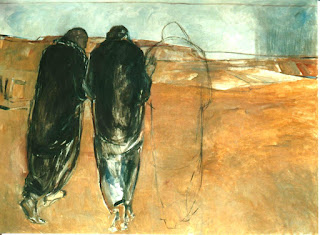An Introduction
Hello,
My name is Curtis Rivers, and I am one of the pastors at Douglas Street United Methodist Church in Cartersville, GA. I am married to Rev. Angela Rivers, the Sr. pastor at Douglas Street, and we have one daughter, Keila, who is entering her sophomore year at Berry College in Rome, Ga. For the first blog, I want to enter the information below as interesting material to stimulate us into thought about the two major divergent political/religious belief systems which influence life here in the United States.
**********************************************************************************
Perhaps the derogatory naming of liberals as “bleeding hearts” is pretty accurate, according to research by Dr. John T. Jost, a professor at New York Universtiy, and Jamie L. Napier, who have produced a most interesting study: Why Are Conservatives Happier Than Liberals? In this study they have found a direct correlation between the happiness of conservatives vs liberals through studying divergent major psychological factors in the general population of the two groups.
It has already been posited by researchers that there is a difference in cognitive styles and motivation of the two groups. As a group, liberals tend to enjoy thinking more and to prolong cognitive closure, while conservatives tend to prefer relatively seimple, unambiguous answers to life’s questions. (Kruglanski, Pierro, Mannetti, & De Grada, 2006) This proclivity toward a more thoughtful and analytical approach to life-situations seemingly provides a great deal of unhappiness for liberals as they witness inequities between groups in life.
Conservatives, however, are more prone to be influenced by what is called system-justification theory: specifically in that they are able to rationalize inequities in society as fair due to a process of rationalization. This system of rationalization makes conservatives more liable to justify inequities based on their understanding of society as a “meritocracy.” In a meritocracy, you get to whatever level of achievement by “earning” that level. If you are poor, you simply haven’t earned the benefits of wealth. This means that, while liberals agonize over inequality, it simply doesn’t bother conservatives in the same fashion.
The current study shows that conservatives exhibit a kind of ideological buffering process which allows them to distance themselves from the inequities others suffer in society, while liberals do not possess this ability to distance themselves from the pain of society’s inequalities. Thus, the liberal politician or public figure who is known for “feeling the pain” of others may not truly have an option in his/her encounters with societal inequities.
The conundrum produced by this psychological divergence between conservatives and liberals may present an interesting puzzle for us to begin working on: how do the two divergent groups use this current research to begin a meaningful dialogue aimed toward establishing an ability to positively bridge the gap this research illustrates.
Let me know your thoughts.
Curtisaurus
My name is Curtis Rivers, and I am one of the pastors at Douglas Street United Methodist Church in Cartersville, GA. I am married to Rev. Angela Rivers, the Sr. pastor at Douglas Street, and we have one daughter, Keila, who is entering her sophomore year at Berry College in Rome, Ga. For the first blog, I want to enter the information below as interesting material to stimulate us into thought about the two major divergent political/religious belief systems which influence life here in the United States.
**********************************************************************************
Perhaps the derogatory naming of liberals as “bleeding hearts” is pretty accurate, according to research by Dr. John T. Jost, a professor at New York Universtiy, and Jamie L. Napier, who have produced a most interesting study: Why Are Conservatives Happier Than Liberals? In this study they have found a direct correlation between the happiness of conservatives vs liberals through studying divergent major psychological factors in the general population of the two groups.
It has already been posited by researchers that there is a difference in cognitive styles and motivation of the two groups. As a group, liberals tend to enjoy thinking more and to prolong cognitive closure, while conservatives tend to prefer relatively seimple, unambiguous answers to life’s questions. (Kruglanski, Pierro, Mannetti, & De Grada, 2006) This proclivity toward a more thoughtful and analytical approach to life-situations seemingly provides a great deal of unhappiness for liberals as they witness inequities between groups in life.
Conservatives, however, are more prone to be influenced by what is called system-justification theory: specifically in that they are able to rationalize inequities in society as fair due to a process of rationalization. This system of rationalization makes conservatives more liable to justify inequities based on their understanding of society as a “meritocracy.” In a meritocracy, you get to whatever level of achievement by “earning” that level. If you are poor, you simply haven’t earned the benefits of wealth. This means that, while liberals agonize over inequality, it simply doesn’t bother conservatives in the same fashion.
The current study shows that conservatives exhibit a kind of ideological buffering process which allows them to distance themselves from the inequities others suffer in society, while liberals do not possess this ability to distance themselves from the pain of society’s inequalities. Thus, the liberal politician or public figure who is known for “feeling the pain” of others may not truly have an option in his/her encounters with societal inequities.
The conundrum produced by this psychological divergence between conservatives and liberals may present an interesting puzzle for us to begin working on: how do the two divergent groups use this current research to begin a meaningful dialogue aimed toward establishing an ability to positively bridge the gap this research illustrates.
Let me know your thoughts.
Curtisaurus

Comments